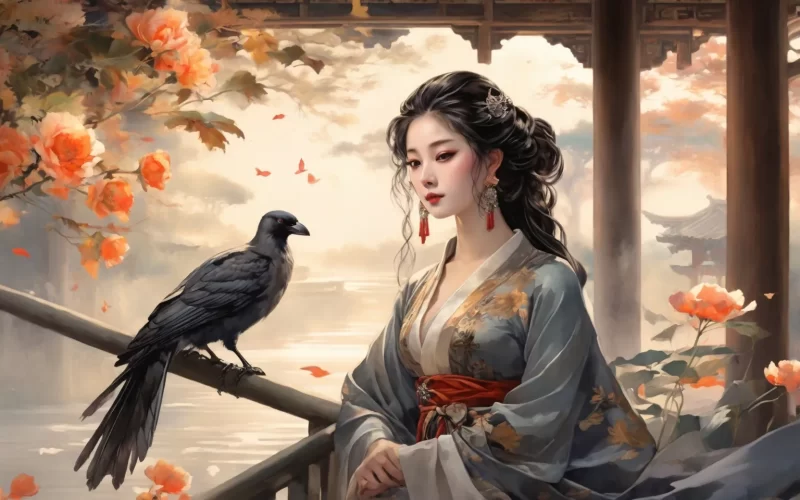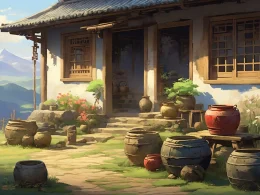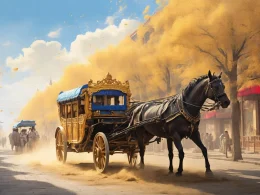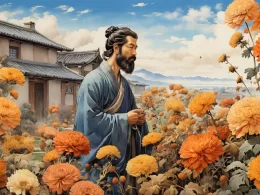She brings a broom at dawn to the Golden Palace doorway
And dusts the hall from end to end with her round fan,
And, for all her jade-whiteness, she envies a crow
Whose cold wings are kindled in the Court of the Bright Sun.
Original Poem
「长信怨」
王昌龄
奉帚平明金殿开,且将团扇共徘徊。
玉颜不及寒鸦色,犹带昭阳日影来。
Interpretation
This poem, composed during the High Tang period, is one of Wang Changling's five "Autumn Lyrics of the Eternal Faith Palace." Drawing upon the Han dynasty tale of Ban Jieyu, the series articulates the loneliness and sorrow of neglected palace women through their own voices. This particular piece captures a morning scene of sweeping and fan-holding solitude, expressing abandonment's quiet despair with exquisite subtlety.
First Couplet: "奉帚平明金殿开,且将团扇共徘徊。"
Fèng zhǒu píng míng jīn diàn kāi, qiě jiāng tuán shàn gòng pái huái.
"At dawn I sweep gold halls with broom in hand; / My round fan companion through empty halls I wander."
The poet begins with mundane routine: though palace gates open, no royal favor comes—only solitary cleaning. "Holding the broom" signifies her lowly status, while "round fan companion" alludes to Ban Jieyu's "autumn fan discarded" metaphor, her beauty like a summer fan now useless in cold seasons. The word "companion" (共) drips with loneliness.
Second Couplet: "玉颜不及寒鸦色,犹带昭阳日影来。"
Yù yán bù jí hán yā sè, yóu dài zhāo yáng rì yǐng lái.
"My jade-like face loses to crows' black hue— / They still bring Zhaoyang's sunlight in their view."
This devastating comparison claims the speaker's beauty is less valued than crows' black feathers, since the birds can freely visit Zhaoyang Palace—symbol of imperial favor (associated with Emperor Cheng's favorite Zhao Feiyan). The "jade face" versus "black crow" contrast weaponizes irony to expose palace life's cruel hierarchies.
Holistic Appreciation
Adopting the palace woman's perspective, the poem reveals cold reality through precise actions—dawn sweeping, fan-clutching wanderings—that embody institutionalized loneliness. Wang Changling's genius lies in letting objects speak: the broom denotes servitude, the fan symbolizes wasted youth, and the crow becomes a biting social commentator. Historical allusions resonate without ostentation, making this a masterclass in restrained expression where every word carries layered meaning.
Artistic Merits
- Narrative-lyric synthesis: Morning routines segue into emotional outbursts
- Symbolic density: Broom, fan, and crow become psychological mirrors
- Allusive subtlety: Ban Jieyu and Zhaoyang references deepen critique invisibly
- Contrastive brilliance: "Jade face" versus "black crow" delivers visceral impact
Insights
Beyond palace walls, the poem explores universal themes of neglect and self-worth erosion under power structures. Wang's indirect expression—using objects and creatures to voice human anguish—demonstrates how art can confront harsh truths through aesthetic refinement. For contemporary readers, it prompts reflection on how systems reduce individuals to disposable objects, and how dignity persists through creative resistance.
Poem translator
Kiang Kanghu
About the poet

Wang Changling (王昌龄), circa A.D. 690 - 756, was a native of Xi'an, Shaanxi Province. Wang Changling's poems were mostly about the Border Places, love affairs and farewells, and he was well known during his lifetime. His seven poems are equal to those of Li Bai, and he is known as the “Master of seven lines”.












